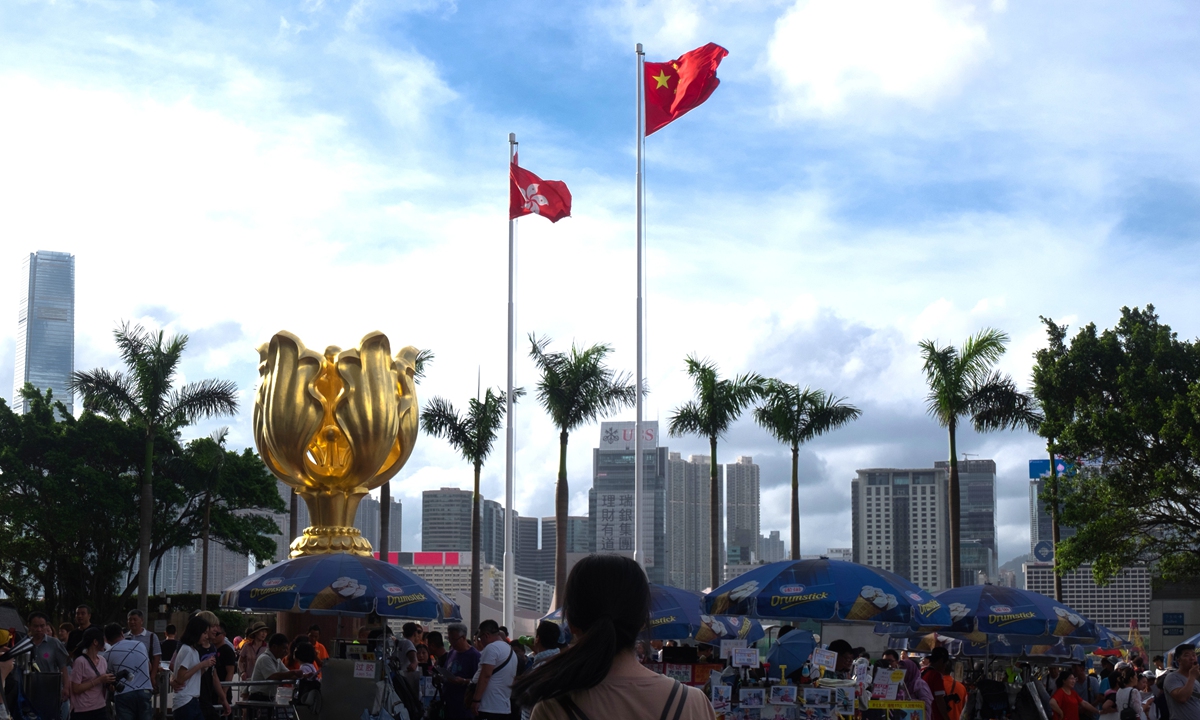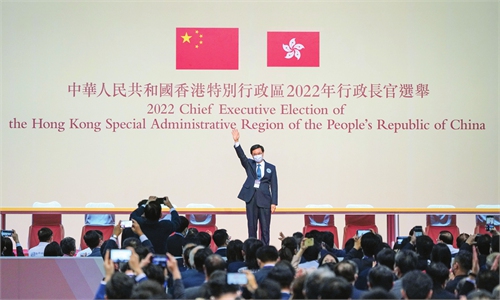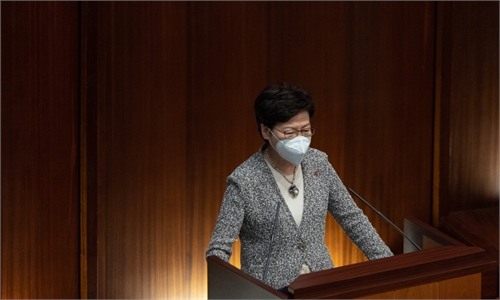West's lecturing approach toward Hong Kong a result of its failure to grasp HK is part of China

Photo: IC
Editor's Note:This year marks the 25th anniversary of Hong Kong's return to the motherland. Despite the Western interference in Hong Kong affairs over the decades, especially in the past three years, Hong Kong has become peaceful and stable, and will remain that way, thanks to the implementation of the National Security Law for Hong Kong. How should we view the Chinese central government's thinking and policies in governing Hong Kong since the implementation of the National Security Law for Hong Kong? What led to the defeat of Western interventionism? Global Times (GT) reporter Wang Wenwen talked to Richard Cullen (Cullen), a visiting professor with the Law Faculty of the University of Hong Kong, over these issues.
GT: Could you talk about the changes in Hong Kong taking place between when you first arrived in Hong Kong and now? What is your deepest feeling?
Cullen: I first arrived in Hong Kong in November 1991, 30 years ago. I've spent some years back in Australia, but I've been in Hong Kong more than 25 years. I think the obvious changes are material changes, like the MTR [Hong Kong's subway system] which is now much bigger with several more lines going to many more places, and the new buildings and things like that.
I had a really good feeling about Hong Kong when I first arrived. I thought it was a marvelous place to visit and to come and live. Here I am now 30 years later, and it still seems just as marvelous. I really love Hong Kong, so I think that's my deepest feeling. I liked it very much at the outset, and I love it even more today.
GT: How do you summarize the changes of the Chinese central government's thinking and policies in governing Hong Kong since the implementation of the National Security Law for Hong Kong? How effective are they?
Cullen: I think I've come to realize, going back before 2019, that Beijing's responses to Hong Kong have been relatively "hands off."
And its responses affecting Hong Kong have been in reaction to what happened in Hong Kong and they have been relatively limited. After 2019 and the insurrection, we've seen, increasingly, a much more hands-on response, but it's still a reaction to what's happened. The National Security Law [for Hong Kong], when I look at it and look at the provisions, I can see how it was largely drafted to address real problems that arose during the very serious insurrection in 2019, which grew out of several major protest marches.
So it's a reaction to the watershed event in Hong Kong. I think it has been effective. It's a radical change, there's no question about that, to the legal framework in Hong Kong. But it has been effective and very important to help restore stability. And I think it will continue to act to underpin stability in Hong Kong. The National Security Law has played a very important role in making Hong Kong safe again.
I would say the NSL so far remains relatively minimal in its impact. I think some of the extreme and radical protesters were hoping there would be a military intervention in Hong Kong from the PLA or the people's armed police. That's been completely avoided. The solution that's been found is legal and constitutional. On balance, this hands-on approach has been necessary - and a good thing - for Hong Kong.
GT: The democratic development of Hong Kong under the "one country, two systems" has its inherent historical logic, institutional logic and practical logic. Why do you think the West does not understand or try to understand the democracy in Hong Kong?
Cullen: I think one of the aspects underpinning this attitude really is historical, both for the British and the Americans and the Europeans generally in their relationship with Hong Kong.
There's a well-known book by a quite famous journalist called Richard Hughes, who was an Australian as I am. He lived in Hong Kong for many years. And indeed he reported from China before 1949. In his book Hong Kong, Borrowed Place, Borrowed Time, he said, in 1968, on page one, that "Hong Kong is China." He was very, very experienced and he was reportedly a part-time British secret agent as well. But he had a very clear view that "Hong Kong is China." I think that has been difficult for certain people to accept. Some leading commentators seem to see Hong Kong, even today, as a kind of international concession city that ultimately belongs to China but is subject to some level of control or influence by leading Anglo-European powers.
So there has been a problem adjusting to the reality that "Hong Kong is China" or is part of China. And we're still going through the process of making this adjustment, at least for some leading commentators, including the last governor of Hong Kong, who developed a special and genuine affection for Hong Kong, but also developed a kind of proprietary feeling about Hong Kong, which I think is not appropriate.

Richard Cullen Photo: Courtesy of Richard Cullen
GT: In the past three years, Hong Kong governance has been subject to Western interference, but Hong Kong has managed to shake off the turmoil and restore the social order. What do you think of the defeat of Western interventionism? Do you think the US and some Western countries will continue to use the Hong Kong-related affairs to put pressure on the Chinese central government in the future? What form might it be?Cullen: I think it's a pity that we came to the point where things got so bad in 2019 that measures like the National Security Law [for Hong Kong] - and the electoral reforms as well - were needed. I'm not pleased that we came to that point, but these remedies were needed as the turmoil in Hong Kong at that time was so great. I'm sure not all within the opposition agreed with what was going on, but no one within that group did anything to stop the turmoil. The broad opposition seemed to be basically controlled by its most extreme elements. They seemed to have no way of controlling and organizing their own behavior in a rational and civil way. And so we had constant riots, fire bombs and so on. So we needed the remedies which were put in place.
I do think that pressure will continue to be put on Hong Kong by those who want to contain the rise of China. This is a very big project led by the US, in which it has tried to get many other countries to participate. So there will continue to be pressure on Hong Kong, certainly a lot of critical pressure. And I would expect to see that that pressure might be intensified over the coming months as there will be a new government in Hong Kong. So those most opposed to the rise of China may aim to intensify criticism of the new [HKSAR] government to make its life more difficult as it commences its job of governing Hong Kong.
I think there's a lot of lobbying and pressure in the US and the West to increase the use of sanction measures to apply more pressure on Hong Kong officials. I think this is a great pity.
Western interference is misguided at the very least. But unfortunately it is to be expected. A number of Western people have a very strong attachment to Hong Kong and a very high regard for Hong Kong, but they do not accept in the way they should that Hong Kong is fundamentally part of China. They regularly talk in ways which suggest that Hong Kong has some kind of special, separated status within China, which gives them permission to interfere, in extreme cases, and to make continuous comments about how Hong Kong should be run according to Western political norms, which they advance.
And really, they've got so much to deal with in their own backyards that needs political attention, whether it's the US, the UK or Europe with a major war now raging within Europe. And yet they still find all this time to lecture Hong Kong.
This lecturing approach connects back to the historical period of Hong Kong under British rule and to the fact that the people who make these instructing comments have difficulty coming to terms with the reality that Hong Kong is now completely confirmed as part of China.
The West - led by the US - and China should be putting far more emphasis on cooperating to deal with major global issues, including global warming, managing the COVID-19 pandemic and the huge economic pressures which are emerging related to economic performance and inflation, and also the world needs to deal, together, with the terrible war in Ukraine. We need to find a way to secure a cease-fire so that serious negotiations can begin.
GT: In your article for other media, you indicate that the EU adopted double standard toward Hong Kong secessionist forces and forces who have tried to secure independence from Spain for Catalonia. What do you think this double standard will lead to in Europe? Will the separatist trend rise in Europe?
Cullen: First, Europe does seem to have brought the biggest, violent separatist problems under control. So it appears to have better control of separatism now than the EU had 20-30 years ago. But the EU impulse to lecture Hong Kong and China about how Hong Kong should be run indicates, frankly, a lack of clear thinking. And you need clear thinking for positive problem-solving. So, when I observe such poorly informed EU thinking applied to us here in Hong Kong, I hope that the EU is thinking more clearly about their many problems in Europe.
Interestingly, perhaps the most significant separatist problem, at the moment, is now outside the EU: I see that there are further calls in Scotland for another referendum to see if Scotland should become an independent country somehow separated from the United Kingdom.
This is happening after Brexit has seen the UK leave the EU. I don't know whether this new call to create a separate Scotland will be successful or not and there are legal arguments about whether Scotland can go ahead and hold such a referendum without permission from London. But let's suppose Scotland does hold a referendum and the referendum says Scotland should separate from England and Wales and leave the United Kingdom and become a separate country. It does occur to me that this will be quite a big headache for the EU, because, presumably, the EU will then be approached by Scotland to see if Scotland can join the EU as a new member. But if Scotland were to leave the UK without full agreement at least in London, then this puts the EU in a difficult position, because it surely does not want to be seen to be encouraging separatism in the UK.
In summary, I think it would be a very good idea for the US, Europe and the UK to put most of the continuous effort they put into criticizing the way that Hong Kong is run - and the role of Beijing - into trying to solve these many problems within their own backyards.



